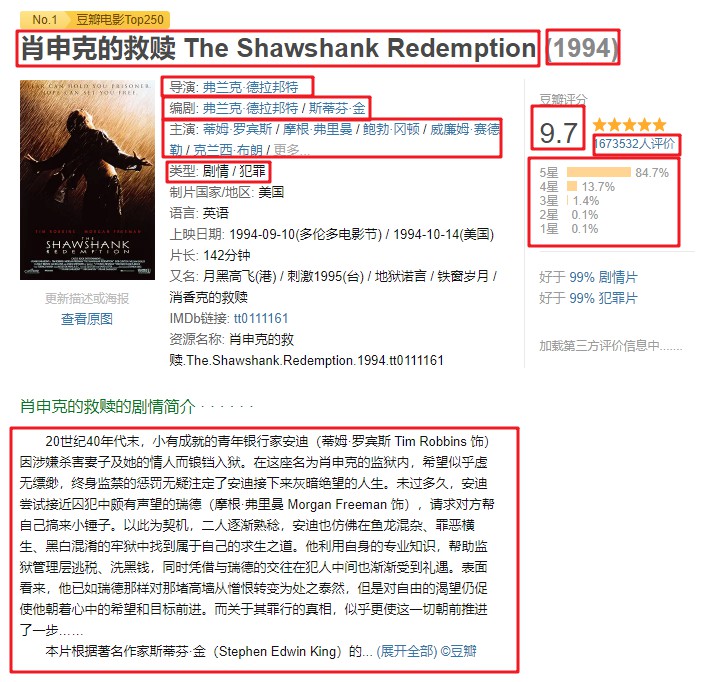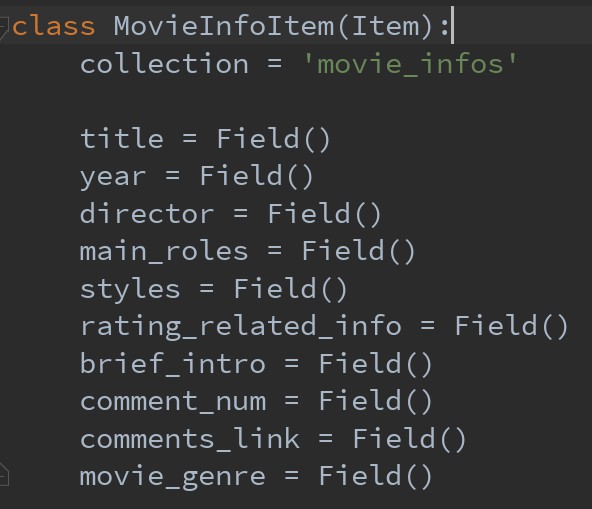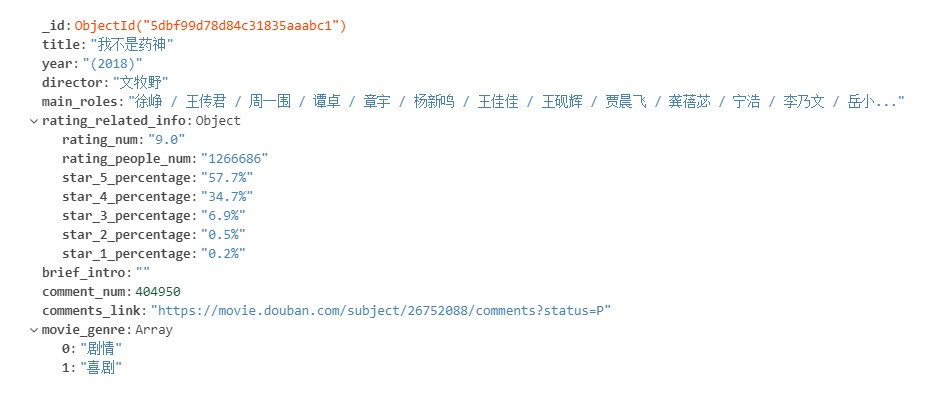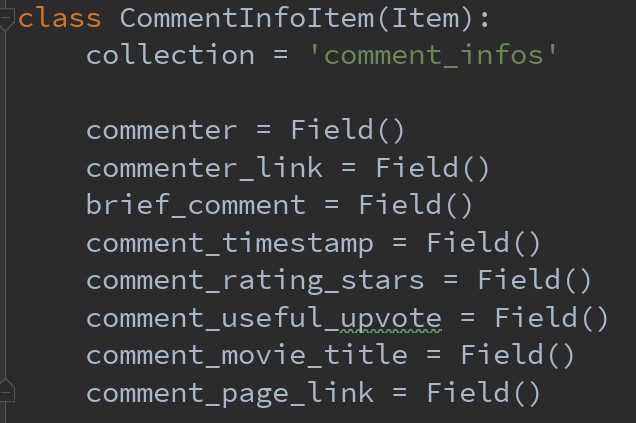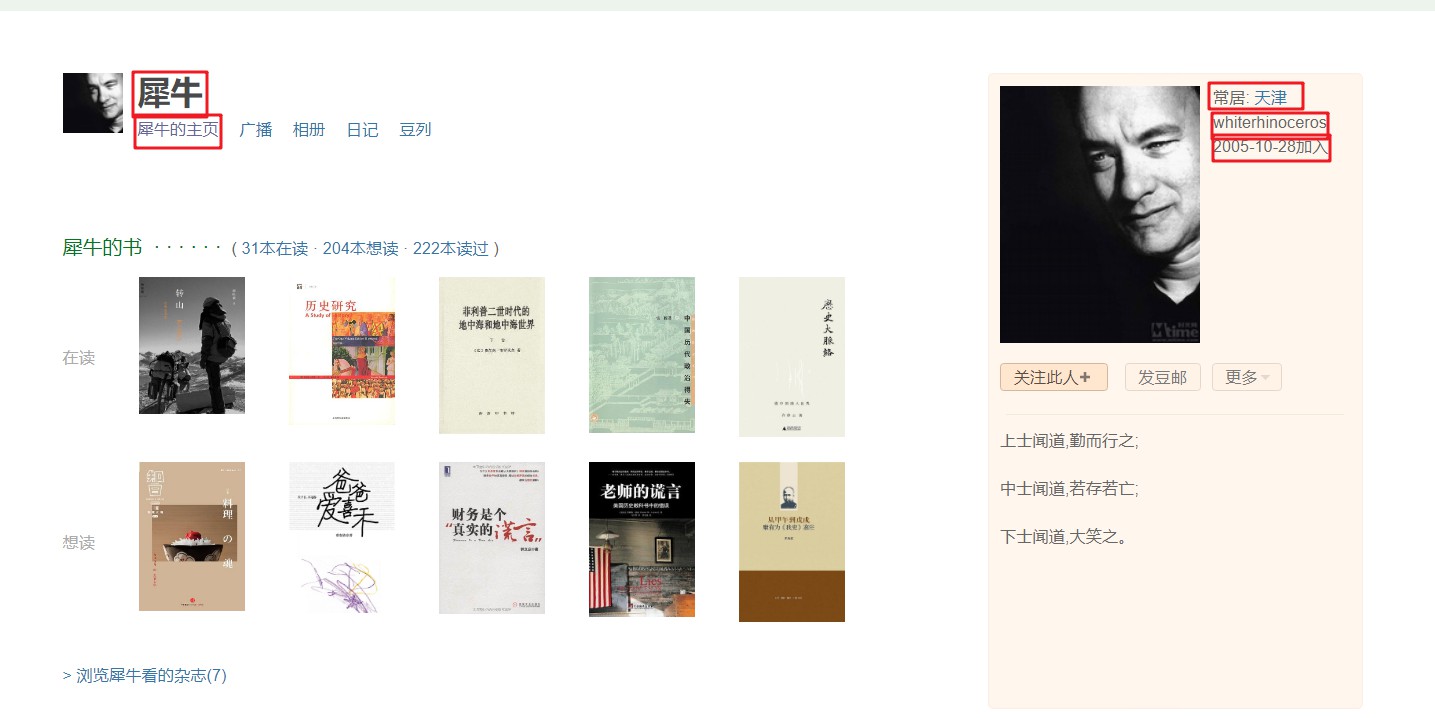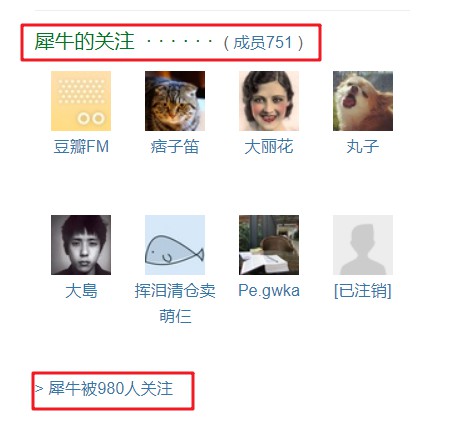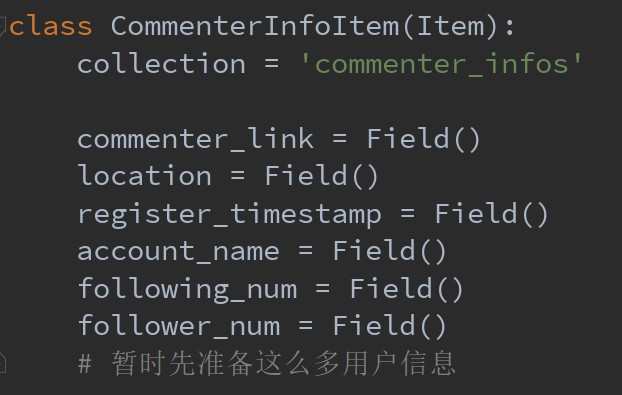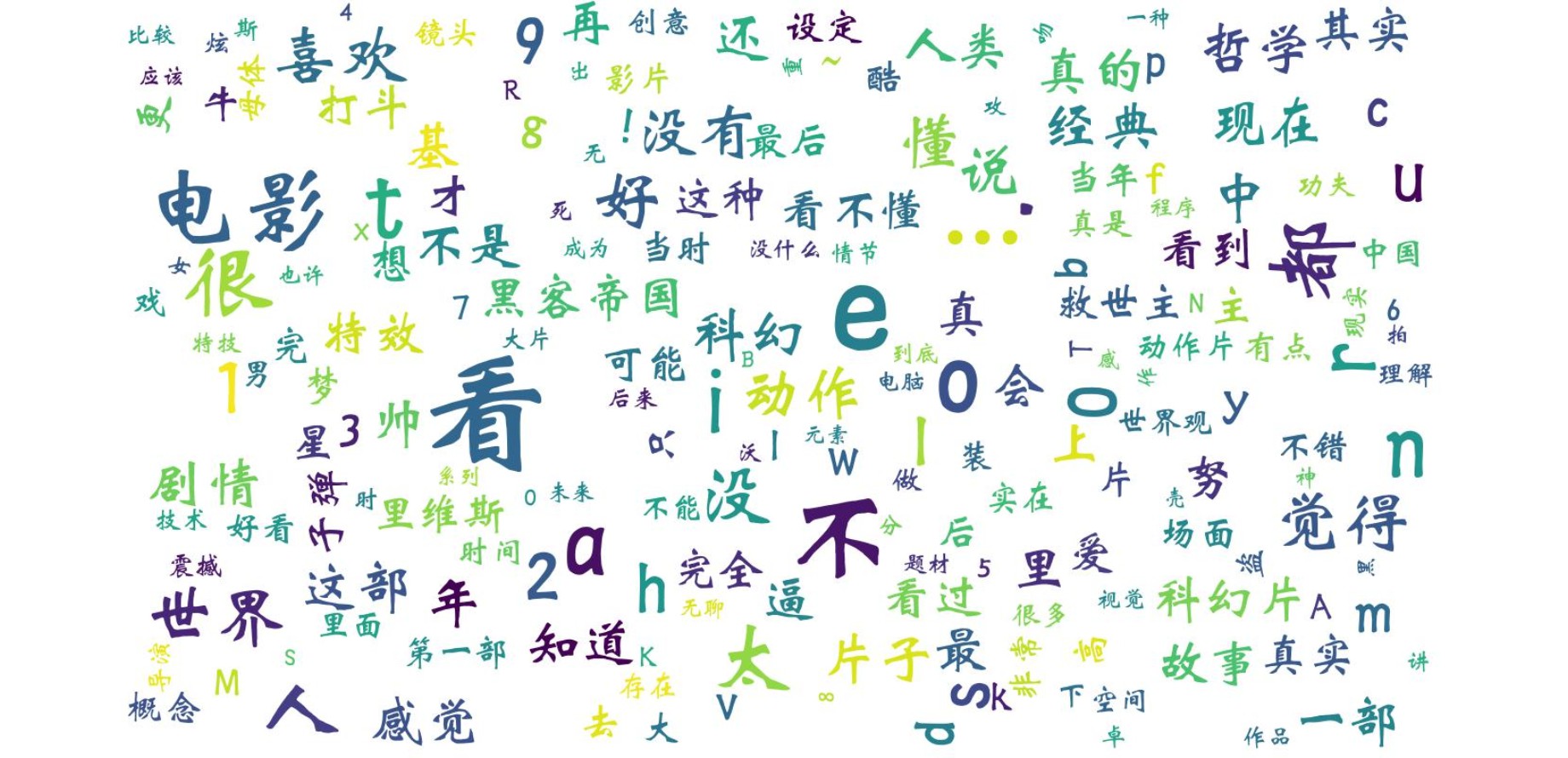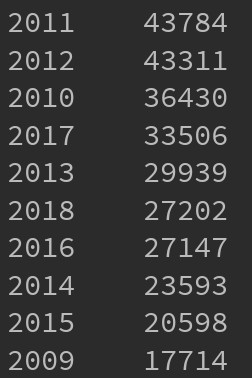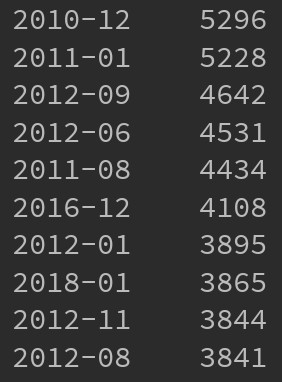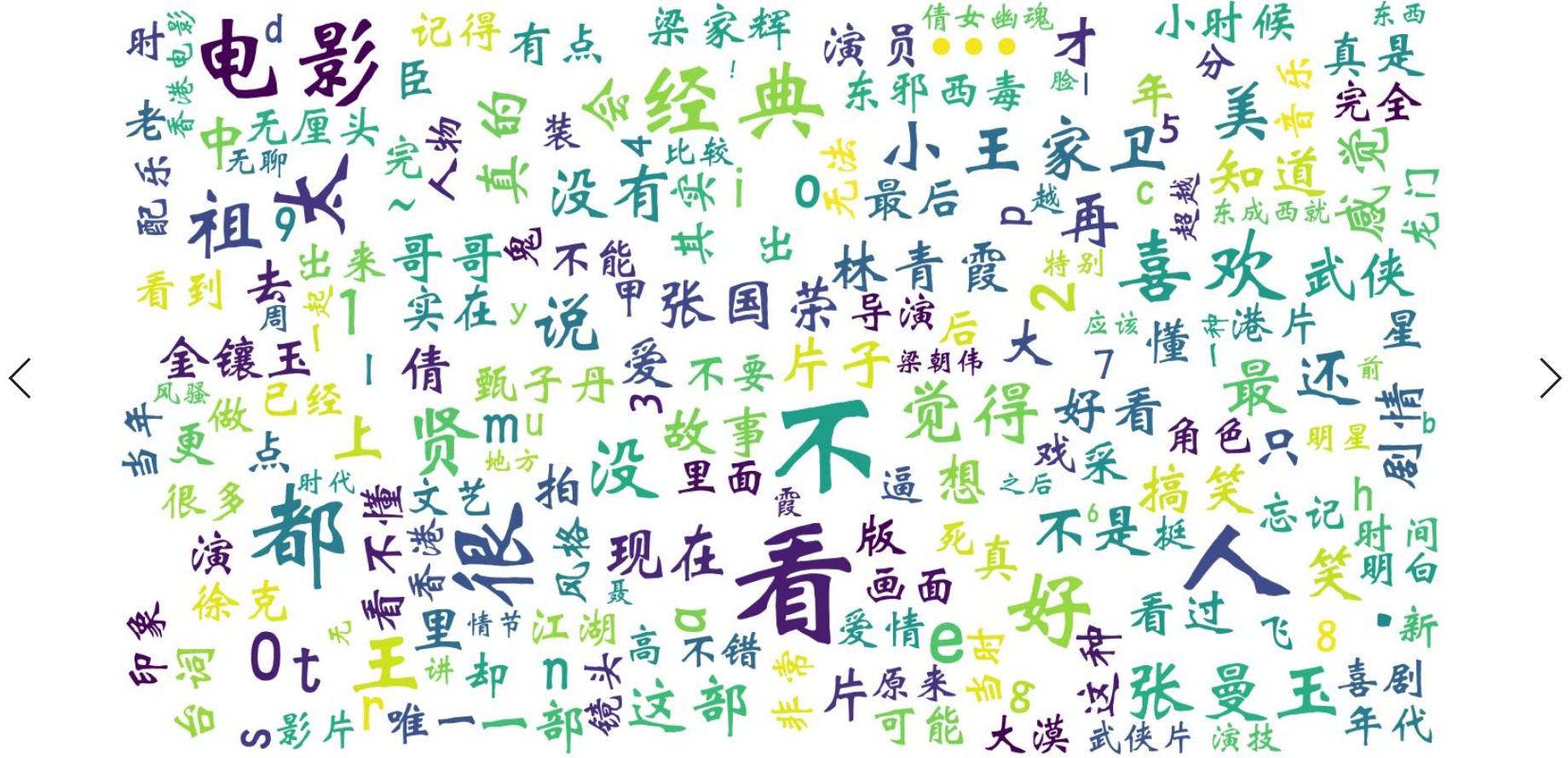信息检索实验 —— TOP250 豆瓣电影短评爬虫与分析
项目概述
这个项目是我们这学期信息检索的实验,老师没做特殊的要求,只要求我们做个爬虫,对爬下来的信息进行一些处理,要做什么全看自己的兴趣,最好能和课上学的相关。因为去年看《Python3网络爬虫开发实战教程》记得有个爬电影的示例,以为是豆瓣电影的爬虫示例,所以本打算水一下改一下示例的代码交上去。只可惜后来发现示例是爬的猫眼电影,于是只能重新看一下爬虫教程改写豆瓣电影的爬虫。在写豆瓣电影爬虫过程中遇到了登录的滑动验证码和封号、封ip等问题,于是只能把《Python3网络爬虫开发实战教程》再看一遍才明白该怎么写...
其中项目目标参考了一位学长去年实验的难度和内容(毕竟只占20%成绩的实验我也不想写成课设...),以及在Google豆瓣爬虫时看到的豆瓣爬虫项目
项目目标
本次我选择的实验题目是 豆瓣影评分析,包括但不限于爬取TOP250电影的所有短评以及电影的相关数据,运用神经网络对评论的评分进行预测和对情感进行分析,评论者的相关信息的可视化,电影类型对应的词云等,随着课程的推进为实验内容增加新的需求。
- 爬取TOP250豆瓣电影所有短评,以及电影的相关信息,包括电影类型,上映时间,以及演员列表等信息;
- 能够对短评的评分进行统计,以及某一类型电影下评论者的性别,年龄,加入豆瓣时间等,可视化表述统计结果,进而分析评论和电影类型的关系;
- 能够分析指定电影指定时间段内的评论内容,包括对短评发表的频率统计,对短评内容的预处理,最终生成词云进行可视化表达;
- 训练循环神经网络,学习短评的情感倾向和根据短评预测评分,测试数据使用再爬取的Mtime时光网的电影评论和评分。
项目构成
Scrapy + Selenium 爬虫
防反爬设置
和参考的爬虫项目一样,这个爬虫项目的大多数时间也花在了防反爬上。参考的爬虫项目反爬的设置没大看懂,于是自己根据书上的教程尝试防反爬策略,最重要的就是使用了selenium。其他的设置就是设置sleep时间等细枝末节,再就是log输出时最好设置成INFO,这样log内容可以更简洁,更容易看出自己爬虫的问题。
踩过的坑
一开始尝试不使用scrapy框架直接爬取,这样可以爬取电影的具体信息,但只能爬取前10页短评,因为短评数量感觉有点少,所以尝试使用scrapy框架。 由于10页以后的短评必须要登录才可以爬取,看到书上有 CookiePool 和 ProxyPool,感觉这个对防反爬有帮助,于是看了一下教程将示例中的微博 CookiePool 改成豆瓣CookiePool,其中做了对登录豆瓣时的滑动验证码的处理,通过selenium实现了自动完成验证码操作。 使用scrapy框架写好爬虫文件后,再将CookiePool和Proxy整合进来,发现一开始测试爬取几百条评论还能正常运行,但测试过三四次之后发现无法正常爬取。通过查看log文件和登录豆瓣发现由于爬取频率比较高被封号。分析之后感觉可能是因为六个账号多个ip登录被豆瓣后台检测出异常,毕竟挂代理登录豆瓣的时候会提示账号异地登录。 所以只能放弃已经废了一天弄完的CookiePool和ProxyPool,拜托同学帮忙注册一个豆瓣账号,尝试使用scrapy对接selenium完成爬虫。按照《Python3网络爬虫开发实战教程》的示例,将之前破解滑动验证码的部分整合到SeleniumMiddleware中。 这个时候测试,发现爬虫可以爬较长时间不被封ip,但测试的三次发现爬了大约12000条短评的时候就会异常,查看log文件发现error信息,感觉可能是被短时间封ip,因为重新启动爬虫仍然可以爬取短评。这个问题暂时没有想到好的解决方法,只能写一个shell脚本,每隔一段时间重新启动爬虫,而爬虫也在每次启动时读取一个txt文件中要爬取的电影范围。 经过测试发现,经过半天多就可以完成短评的爬取,由于豆瓣短评数量的限制,最终爬取的短评数量为 338143 条。
爬取信息设置
TOP250_douban_movies 文件夹是 scrapy 项目文件夹,comments_spider.sh 是用于控制定时启动豆瓣短评爬虫的 shell 脚本。
一开始本来将三个爬虫写在一个文件里,想爬下电影链接解析后接着爬这部电影的短评,然后再爬取评论者的信息。但后来发现这样遇到bug时难debug,而且如果爬虫因为某些异常退出后重新启动爬取的代价比较大。最后分成三个爬虫,先调用 douban_movies 爬虫,然后才可以调用 comment_infos 爬虫,最后才能调用 commenter_infos 爬虫。
spiders 文件夹下有三个spider,分别是 douban_movies.py —— 用于爬取 TOP250 电影榜的电影名称和电影链接,以及爬取每部电影的具体信息;
对于每部电影具体信息的爬取,并没有和参考的TOP250豆瓣电影爬虫一样,有的信息是感觉太多自己用不上,有的信息是感觉不好分析可能增加太多工作量...
comments.py —— 用于爬取每部电影的短评,由于豆瓣的限制,最多只能爬取好评、中评、差评各 500 条;
本来一开始没想存储这条短评的网页链接,但一开始运行完爬虫发现只爬了27万多条短评,和一开始估计的37万相差过多,虽然可能是因为有的电影中评和差评数量可能不足500条,以及爬的时间过程会被豆瓣封一段时间ip,但短评数量依然相差有点多。所以后面打算再爬一次,为了避免以后由于封ip中断爬虫导致需要重新爬取的问题,所以事先存下短评的网页链接,根据网页链接和评论者的链接判断是否爬过这条评论,这样就可以在爬取时防止爬取已经爬过的短评,可以多次运行爬虫爬取未爬过的数据。
commenters.py —— 用于爬取每个短评的评论者的信息。
在爬取过程中查看log文件可以发现爬取评论者信息时的一些问题,比如 该用户已经主动注销帐号、没有填写常居地、账号根据用户管理细则已被永久停用等。对于常居地和注册时间爬取有问题的评论者可以以"未知"等默认值填充字段,但如果账号已注销或被停用则不储存评论者信息。
数据分析
数据分析的代码都放在 douban_movies_analysis 文件夹下,数据分析分为统计分析和深度学习模型分析,暂时只完成了部分统计分析,后面会逐步添加新的内容。
统计分析
一开始数据分析的代码是非常繁琐冗长的,是每次直接从数据库中读取所需要分析的信息,放到一个列表或者字典中,然后进行统计。
这样写了大部分代码后想看一下 GitHub 上豆瓣电影影评分析是如何写的,然后发现之前的统计分析代码可以用 DataFrame 更简洁的 API 实现,于是又重新看了一下《Python数据科学手册》中 Pandas 部分,学习了一下 DataFrame 方法的使用,有的地方也参考了 GitHub 上影评分析作者的实现,重新用 DataFrame 实现了数据的统计分析。
movie 信息的分析
载入电影信息的 DataFrame
def get_movie_dataframe():
movie_info_dict_list = []
movie_infos_collection = db['movie_infos']
for movie_info in movie_infos_collection.find():
movie_info_dict = {}
movie_genre_list = movie_info['movie_genre']
movie_title = movie_info['title']
movie_title = movie_title.split(' ')[0]
rating_related_info = movie_info['rating_related_info']
movie_info_dict['movie_title'] = movie_title
movie_info_dict['year'] = movie_info['year']
movie_info_dict['director'] = movie_info['director']
movie_info_dict['main_roles'] = movie_info['main_roles']
movie_info_dict['comment_num'] = movie_info['comment_num']
movie_info_dict['rating_num'] = rating_related_info['rating_num']
movie_info_dict['rating_people_num'] = rating_related_info['rating_people_num']
movie_info_dict['star_5_percentage'] = rating_related_info['star_5_percentage']
movie_info_dict['star_4_percentage'] = rating_related_info['star_4_percentage']
movie_info_dict['star_3_percentage'] = rating_related_info['star_3_percentage']
movie_info_dict['star_2_percentage'] = rating_related_info['star_2_percentage']
movie_info_dict['star_1_percentage'] = rating_related_info['star_1_percentage']
movie_info_dict['comments_link'] = movie_info['comments_link']
# genre 的处理暂时先这样
movie_info_dict['movie_genre_list'] = movie_genre_list
movie_info_dict['brief_intro'] = movie_info['brief_intro']
movie_info_dict['util_num'] = 1
movie_info_dict_list.append(movie_info_dict)
movie_info_dataframe = pd.DataFrame(movie_info_dict_list)
return movie_info_dataframe获取电影评分前 rank_num 名:
def stars_movies(rank_num=10):
return dataframe.sort_values('rating_num', ascending=False)[['movie_title','rating_num']].head(rank_num)分析前十名上榜电影最多的导演
def director_movies(rank_num = 10):
director_statistics = dataframe.groupby('director')['util_num'].sum()
director_statistics = director_statistics.sort_values(ascending=False).head(rank_num)
return director_statistics分析投票数前rank_num名电影
def rating_people_num_movies(rank_num=10):
rating_people_num_statistics = dataframe.sort_values('rating_people_num', ascending=False)[['movie_title', 'rating_people_num']].head(rank_num)
return rating_people_num_statistics分析评论数前rank_num名电影
def comments_num_movies(rank_num=10):
comments_num_statistics = dataframe.sort_values('comment_num', ascending=False)[['movie_title', 'comment_num']].head(rank_num)
return comments_num_statistics分析电影上映年份的电影数量,打算以后实现通过绘图的功能
def year_movies(rank_num=10):
year_statistics = dataframe.groupby('year')['util_num'].sum()
year_statistics = year_statistics.sort_values(ascending=False).head(rank_num)
return year_statistics对每部电影电影生成对应的词云
def generate_movie_cloud():
clouds_path = '../../cloud_imgs/movie_clouds/'
comment_collection = db['comment_infos']
# 先得到250部电影的title
movie_comments_dict = get_movie_comments_dict()
comment_infos = comment_collection.find()
for comment_info in comment_infos:
comment_movie = comment_info['comment_movie_title']
comment_movie = comment_movie.split(' ')[0]
brief_comment = comment_info['brief_comment']
if comment_movie in movie_comments_dict.keys():
movie_comments_dict[comment_movie].append(brief_comment)
else:
print('this movie is not in the dict')
print(comment_movie)
stop_words = init_stopwords()
for movie_title in movie_comments_dict.keys():
comment_words_df = get_movie_comments_words_dataframe(movie_title)
comment_words_df = comment_words_df[~comment_words_df.comment_word.isin(stop_words.stopword)]
# 统计词频
words_stat = comment_words_df.groupby(by=['comment_word'])['comment_word'].agg({"计数": np.size})
words_stat = words_stat.reset_index().sort_values(by=["计数"], ascending=False)
word_frequency = {x[0]: x[1] for x in words_stat.head(1000).values}
store_path = clouds_path + str(movie_title)
word_cloud = WordCloud(
font_path="../../fonts/JingDianWeiBeiJian-1.ttf",
background_color='white',
max_words=200,
max_font_size=200,
width=1400,
height=800
)
word_cloud.fit_words(word_frequency)
word_cloud.to_file(store_path + ".jpg")可以看到词云中仍有一些停用词没有过滤掉的词汇,比如“电影”,对于影评分析来说这也应该放到停用词中,还有一些英文和数字也应该被过滤掉,打算以后在停用词表中添上这些要过滤掉的词。
短评的分析
获取某一种类型电影短评的 DataFrame
def get_genre_comments_words_dataframe(genre='剧情'):
brief_comments_list = []
comment_infos_collection = db['comment_infos']
comment_movie_genre_dict = get_movie_genre_dict()
for comment_info in comment_infos_collection.find():
comment_movie_title = comment_info['comment_movie_title']
comment_movie_genre_list = comment_movie_genre_dict[comment_movie_title]
if genre in comment_movie_genre_list:
brief_comments_list.append(comment_info['brief_comment'])
comment_words = []
for comment in brief_comments_list:
comment_seqs = jieba.lcut(comment)
for single_comment_seq in comment_seqs:
comment_words.append(single_comment_seq)
comment_words_df = pd.DataFrame({'comment_word': comment_words})
return comment_words_df分析指定电影其短评的发表时间频率(以年计),即将时间跨度等分,统计每个时间跨度内的短评数量,打算以后做一下根据这个的绘图
def comments_year_frequency(rank_num=10):
year_comment_df = dataframe.groupby('commenter').apply(comment_df_year)
year_comment_statistics = year_comment_df.groupby('comment_timestamp')['util_num'].sum()
year_comment_statistics = year_comment_statistics.sort_values(ascending=False).head(rank_num)
return year_comment_statistics测试了所有短评数量最多的前十年:
分析指定电影其短评的发表时间频率(以月计)
def comments_month_frequency(rank_num=10):
month_comment_df = dataframe.groupby('commenter').apply(comment_df_month)
month_comment_statistics = month_comment_df.groupby('comment_timestamp')['util_num'].sum()
month_comment_statistics = month_comment_statistics.sort_values(ascending=False).head(rank_num)
return month_comment_statistics测试了所有短评数量最多的前十个月:
对电影的每种类型生成对应的词云
def generate_genre_cloud():
clouds_path = '../../cloud_imgs/genre_clouds/'
comment_collection = db['comment_infos']
movie_genres_dict = get_movie_genre_dict()
genres_comments_dict = get_genre_dict()
for comment_info in comment_collection.find():
# 用电影名找到这个评论对应电影的类型
comment_movie = comment_info['comment_movie_title']
comment_movie = comment_movie.split(' ')[0]
brief_comment = comment_info['brief_comment']
comment_movie_genres_list = movie_genres_dict[comment_movie]
for comment_movie_genre in comment_movie_genres_list:
if comment_movie_genre in genres_comments_dict.keys():
genres_comments_dict[comment_movie_genre].append(brief_comment)
else:
print('comment_movie_genre is not in the genres_comments_dict')
print(comment_movie_genre)
stop_words = init_stopwords()
for genre in genres_comments_dict.keys():
comment_words_df = get_genre_comments_words_dataframe(genre)
comment_words_df = comment_words_df[~comment_words_df.comment_word.isin(stop_words.stopword)]
# 统计词频
words_stat = comment_words_df.groupby(by=['comment_word'])['comment_word'].agg({"计数": np.size})
words_stat = words_stat.reset_index().sort_values(by=["计数"], ascending=False)
word_frequency = {x[0]: x[1] for x in words_stat.head(1000).values}
store_path = clouds_path + str(genre)
word_cloud = WordCloud(
font_path="../../fonts/JingDianWeiBeiJian-1.ttf",
background_color='white',
max_words=200,
max_font_size=200,
width=1400,
height=800
)
word_cloud.fit_words(word_frequency)
word_cloud.to_file(store_path + ".jpg")武侠片的词云:
可以看到有前面每部电影词云的问题,不少应该过滤掉的词汇还留着。
commenter 信息的分析
commenter 信息的分析还没有写....



